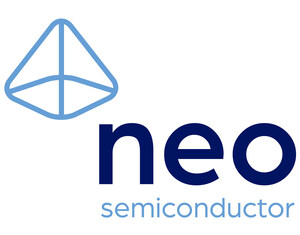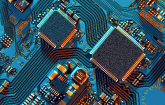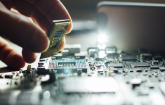The new 3D X-AI Chip accelerates AI performance by 100X and reduces power consumption by 99%
SAN JOSE, Calif., Aug. 5, 2024 /PRNewswire/ -- NEO Semiconductor, a leading developer of innovative technologies for 3D NAND flash memory and 3D DRAM, announced today the development of its 3D X-AI™ chip technology, targeted to replace the current DRAM chips inside high bandwidth memory (HBM) to solve data bus bottlenecks by enabling AI processing in 3D DRAM. 3D X-AI can reduce the huge amount of data transferred between HBM and GPUs during AI workloads. NEO's innovation is set to revolutionize the performance, power consumption, and cost of AI Chips for AI applications like generative AI.
AI Chips with NEO's 3D X-AI technology can achieve:
- 100X Performance Acceleration: contains 8,000 neuron circuits to perform AI processing in 3D memory.
- 99% Power Reduction: minimizes the requirement of transferring data to the GPU for calculation, reducing power consumption and heat generation by the data bus.
- 8X Memory Density: contains 300 memory layers, allowing HBM to store larger AI models.
"Current AI Chips waste significant amounts of performance and power due to architectural and technological inefficiencies," said Andy Hsu, Founder & CEO of NEO Semiconductor. "The current AI Chip architecture stores data in HBM and relies on a GPU to perform all calculations. This separated data storage and data processing architecture makes the data bus an unavoidable performance bottleneck. Transferring huge amounts of data through the data bus causes limited performance and very high power consumption. 3D X-AI can perform AI processing in each HBM chip. This can drastically reduce the data transferred between HBM and GPU to improve performance and reduce power consumption dramatically."
A single 3D X-AI die includes 300 layers of 3D DRAM cells with 128 Gb capacity and one layer of neural circuit with 8,000 neurons. According to NEO's estimation, this can support up to 10 TB/s of AI processing throughput per die. Using twelve 3D X-AI dies stacked with HBM packaging can achieve 120 TB/s processing throughput, resulting in a 100X performance increase.
"The application of 3D X-AI technology can accelerate the development of emerging AI use cases and promote the creation of new ones," said Jay Kramer, President of Network Storage Advisors. "Harnessing 3D X-AI technology to create the next generation of optimized AI Chips will spark a new era of innovation for AI Apps."
NEO Semiconductor is showcasing its technologies at FMS: the Future of Memory and Storage, booth #507. Andy Hsu will deliver a keynote address titled "New 3D AI Chip Technology Accelerates Generative AI" on August 6th at 11:45 a.m. Pacific Time.
To schedule a meeting with NEO Semiconductor at FMS, please contact: [email protected].
About NEO Semiconductor
NEO Semiconductor is a high-tech company focused on advancing 3D NAND flash, 3D DRAM, and 3D AI technologies. The company was founded in 2012 by Andy Hsu and a team in San Jose, California, and owns more than 25 U.S. patents. In 2020, the company made a breakthrough in 3D NAND architecture named X-NAND™ that can achieve SLC performance from TLC and QLC memory to provide high-speed, low-cost solutions for many applications, including 5G and AI. In 2022, the company launched its X-DRAM™ technology, representing a new architecture that can deliver DRAM with the world's lowest power consumption. In 2023, NEO launched its ground-breaking 3D X-DRAM™ technology, a game changer in the memory industry, enabling the world's first 3D NAND-like DRAM to solve capacity scaling bottlenecks and move the market past the limitations of 2D DRAM. In 2024, 3D X-AI™ technology was unveiled to pioneer AI neural networks in 3D memory to revolutionize the performance, power consumption, and cost of AI Chips. For more information, visit https://neosemic.com.
Photo: https://mma.prnewswire.com/media/2474998/NEO_3D_X_AI_Chip.jpg
Logo: https://mma.prnewswire.com/media/2462541/Neo_Logo.jpg
Media and Analyst Contact:
Maya Lustig
[email protected]
SOURCE NEO Semiconductor






Share this article